
The Cure are an English rock band formed in 1978 in Crawley, West Sussex. Throughout numerous lineup changes since the band's formation, guitarist, lead vocalist, and songwriter Robert Smith has remained the only constant member. The band's debut album was Three Imaginary Boys (1979) and this, along with several early singles, placed the band in the post-punk and new wave movements that had sprung up in the United Kingdom. Beginning with their second album, Seventeen Seconds (1980), the band adopted a new, increasingly dark and tormented style, which, together with Smith's stage look, had a strong influence on the emerging genre of gothic rock as well as the subculture that eventually formed around the genre.
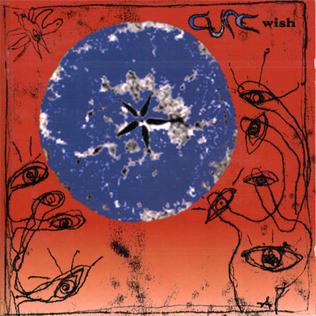
Wish is the ninth studio album by British alternative rock band The Cure, released on 21 April 1992 through record label Fiction in the UK and Elektra in the US. Wish was the Cure's most commercially successful in the band's career, debuting at number one in the UK and number two in the United States, where it sold more than 1.2 million copies.
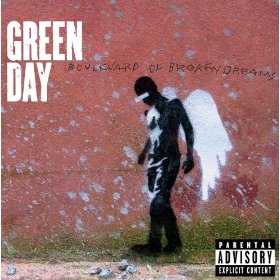
"Boulevard of Broken Dreams" is a song by American rock band Green Day. It is the fourth track from their seventh studio album American Idiot (2004). Reprise Records released "Boulevard of Broken Dreams" as the second single from American Idiot on November 29, 2004. The song's lyrics were written by lead singer Billie Joe Armstrong, and the music was composed by the band. Production was handled by Rob Cavallo and Green Day.

"Lovesong" is a song by English alternative rock band the Cure, released as the third single from their eighth studio album, Disintegration (1989), on 21 August 1989. The song saw considerable success in the United States, where it reached the number-two position in October 1989 and became the band's only top-10 entry on the Billboard Hot 100. In the United Kingdom, the single charted at number 18, and it peaked within the top 20 in Canada and Ireland.

"Californication" is a song by American rock band Red Hot Chili Peppers from their seventh album, Californication (1999). Released as a single in June 2000, it reached number 69 on the US Billboard Hot 100, number 16 on the UK Singles Chart, and number one on the Billboard Mainstream Rock Tracks and Modern Rock Tracks charts. It was the third number-one Californication single in Iceland.
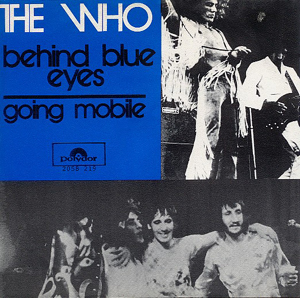
"Behind Blue Eyes" is a song by the English rock band the Who, recorded in 1971. It was the second single from their fifth album Who's Next and was originally written by Pete Townshend for his Lifehouse project. The song is one of the Who's best-known recordings and has been covered by many artists.

"Otherside" is a song by American rock band Red Hot Chili Peppers. It was released as the third single from their seventh studio album, Californication (1999), and confronts the battles addicts have with their prior addictions. The track was released in Australia and New Zealand in 1999 and was given an international release in January of the following year.
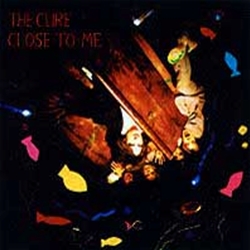
"Close to Me" is a song by English rock band the Cure, released in September 1985 as the second and final single from their sixth album, The Head on the Door.

"Hot Hot Hot!!!" is the name of a 1988 single by British rock band The Cure from their album Kiss Me, Kiss Me, Kiss Me. The song reached number 45 in the UK, whereas it was more successful in Ireland where it reached number 18, and in Spain where it reached the Top 10.

"Lullaby" is a song by English rock band the Cure from their eighth studio album, Disintegration (1989). Released as a single on 10 April 1989, the song is the band's highest-charting single in their home country, reaching number five on the UK Singles Chart. It additionally reached number three in Germany and Ireland while becoming a top-10 hit in several other European countries and New Zealand. The music video won the British Video of the Year at the 1990 Brit Awards.

"Never Enough" is a song by the English rock band The Cure, released as a single in September 1990 from their 1990 remix album Mixed Up. The song topped the US Billboard Modern Rock Tracks chart, reached number three in Finland and Poland, and peaked within the top 20 in Germany, Ireland, New Zealand, Spain and the United Kingdom.
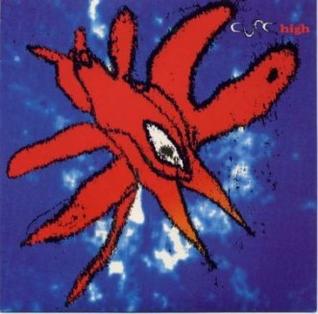
"High" is a song by English rock band the Cure, released as the lead single from their ninth album Wish on 16 March 1992. The track received mostly positive reviews and was commercially successful, reaching number one on the US Billboard Modern Rock Tracks chart, number six on the Irish Singles Chart, and number eight on the UK Singles Chart. It found the best commercial success in Portugal, where it peaked at number two, and in Australasia, reaching number five in Australia and number four in New Zealand; it is the band's highest-charting single in both countries.

"Friday I'm in Love" is a song by British rock band the Cure. Released as the second single from their ninth studio album, Wish (1992), in May 1992, the song was a worldwide hit, reaching number six in the UK and number 18 in the United States, where it also topped the Modern Rock Tracks chart. It also won the award for European Viewer's Choice for Best Music Video at the 1992 MTV Video Music Awards.

"A Letter to Elise" is a song by English rock band The Cure, released as the third and final single from the album Wish in October 1992.

"The 13th" is a song by English rock band the Cure, released as the first single from the band's 10th studio album, Wild Mood Swings (1996), on 22 April 1996. The song was commercially less successful than the band's previous hits from Disintegration and Wish, but it still managed to reach the top 20 in several territories, including Wallonia, Finland, Sweden and the United Kingdom. It was most successful in Hungary, where it reached number two, and in Italy, where it peaked at number five.

"Can't Stop" is a song by American rock band Red Hot Chili Peppers from their eight studio album, By the Way (2002). It was released as the third single released from the album on February 3, 2003. The song was the band's eighth number one on the US Billboard Modern Rock Tracks chart, where it spent three weeks topping the chart, and peaked at number 57 on the Billboard Hot 100. "Can't Stop" performed moderately well on international charts as well as on the Billboard Modern Rock Tracks and Mainstream Rock charts.

The English rock band The Cure have released 13 studio albums, five live albums, 12 compilation albums, 10 extended plays, and 37 singles on Fiction Records and Geffen Records. They have also released 10 video albums and 43 music videos.
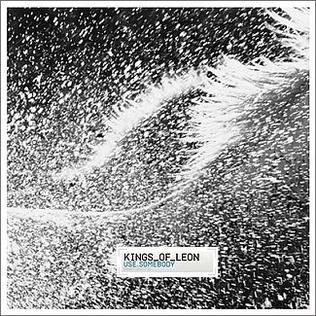
"Use Somebody" is a song recorded by the American rock group Kings of Leon. It was the second single from the band's fourth studio album Only by the Night (2008), released on December 8, 2008.

"Run to You" is a song by Canadian singer-songwriter Bryan Adams. It was released in 1984 as the lead single from his fourth album, Reckless (1984). The track deals with the subject of infidelity, and is sung from the perspective of a man who declares that he will continue to "run to" his seductive mistress over his faithful partner; critic Ira Robbins for CMJ called it a "cheating classic". In the accompanying music video, however, Adams portrays his guitar as the object of desire.
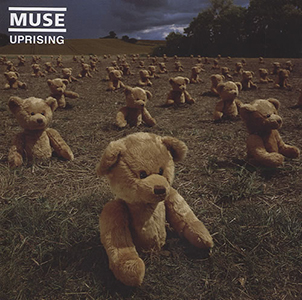
"Uprising" is a song by the English rock band Muse. It was released on 4 August 2009 as the lead single from the band's fifth studio album, The Resistance (2009). The song was written by band member Matt Bellamy, produced by the band, and mixed by Spike Stent. "Uprising" peaked at number 37 on the US Billboard Hot 100, and peaked in the top 10 in seven countries. It was certified gold in the United Kingdom, gold in four countries, platinum in two countries, and double-platinum in the United States, making it Muse's best-selling single.




















